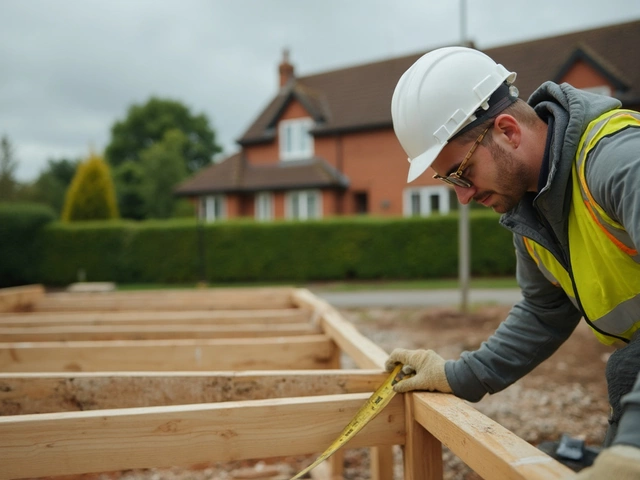Understanding the Role of a Building Contractor

Ever wonder what a building contractor actually does? Well, you're in luck. These guys and gals are pretty much the quarterbacks of any construction project. They're in charge of turning paper plans into bricks-and-mortar reality. Need someone to manage workers, keep track of budget, and make sure everything's up to code? Yep, that's your building contractor.
The scope of their job is wide. They deal with architects, engineers, and even suppliers. They plan project phases, secure permits, and organize inspections. In short, they're the go-to for keeping the construction machine running smoothly. It's a big responsibility, which is why they have to be jack-of-all-trades when it comes to construction know-how.
- What Exactly Does a Building Contractor Do?
- Key Skills and Qualifications
- The Building Contractor's Toolkit
- Tips for Hiring the Right Contractor
What Exactly Does a Building Contractor Do?
So, what does a building contractor do? Well, consider them the ringleader of your construction circus. They juggle a plethora of tasks to keep everything on schedule and within budget. Let's break it down.
Project Planning and Management
A building contractor kicks things off by planning the entire project. This isn’t just about setting dates—it’s about coordinating with architects and determining the best path forward. They outline phases of construction, ensuring every aspect aligns with local regulations and codes. Think of them as the blueprint whisperer who turns scribbles on paper into functional structures.
Sourcing and Managing Subcontractors
In the construction world, teamwork makes the dream work, and contractors are the ultimate team players. They hire and oversee specialized subcontractors, like electricians and plumbers, to handle specific tasks. Good contractors have a tight crew they trust, and they manage these relationships to ensure everyone is on the same page.
Quality Control and Permits
Quality is king in construction. A key part of their role is making sure everything meets high standards. They arrange inspections and make sure all necessary permits are secured. These steps are crucial to avoid any nasty surprises once the project wraps up.
Budget and Time Management
Keeping projects on time and on budget is no small feat. Contractors handle cost estimates, negotiate with suppliers, and track every dollar spent to ensure the finances don't spiral out of control. They also set milestones and deadlines, continuously adjusting them as needed to deal with any hiccups along the way.
Here's a look at some typical contract tasks:
- Negotiating terms with clients and suppliers.
- Craning schedules and project timelines.
- Ensuring safe working conditions.
- Monitoring daily work activities.
All said and done, a reliable building contractor is like the orchestra conductor of construction—making sure every piece of the puzzle fits seamlessly into place.
Key Skills and Qualifications
So, what does it take to be a building contractor? For starters, wearing many hats is a must. These pros have a mix of skills from hands-on construction know-how to project management smarts. Here’s a breakdown of what they're packing in their toolkit:
Technical Knowledge
First off, a deep understanding of construction techniques. They're the ones ensuring everything’s up to the latest safety standards and codes. They've got to know their tools and materials like the back of their hand. In fact, a study by the New Zealand Building Association found that contractors with robust technical skills see 25% fewer project delays.
Management Prowess
Managing time and people is their bread and butter. They organize labor, ensure everyone’s where they should be, and keep things chugging along. Good contractors bring projects in on time and under budget more often than not. Plus, they excel at problem-solving, quickly addressing hiccups before they spiral.
Communication Skills
These folks need to chat with everyone from clients to crane operators without a hitch. Being able to communicate clearly prevents headaches. It’s all about laying things out, so folks are on the same page and expectations align.
Qualifications
While there's no one-size-fits-all path, most building contractors have a mix of formal education and real-world experience. Many start as tradespeople, picking up skills along the way. A degree in construction or engineering doesn’t hurt, either. Licensing requirements vary, so keeping up with local regulations is key.
Regulatory Know-How
Finally, they must stay updated on the ever-changing laws and regulations. Shifting building codes can impact impacts how projects are planned and executed. This ensures projects are both legal and safe.

The Building Contractor's Toolkit
Dive into the bag of tricks every building contractor must juggle, and you'll find a treasure chest of tools—both physical and mental. To pull off a successful construction project, contractors rely on a mix of technology and good old-fashioned savvy.
Essential Tools of the Trade
Let's start with the tech side. Today, most contractors wouldn't head to a site without their trusty laptop or tablet. Project management software like Procore or Buildertrend helps keep tabs on timelines, budgets, and communication with the team. They're the go-to for organizing tasks, making sure everyone’s on the same page, and keeping errors at bay.
Traditional Tools Still Matter
Of course, no contractor would be complete without their trusty tape measure and level. These timeless tools still play a crucial role in ensuring accuracy on-site. Laser levels and electronic measuring devices have modernized old practices, speeding up tasks and improving precision.
Communication and Negotiation Skills
Beyond gadgets and gear, a contractor's most valuable tools might just be their communication and negotiation skills. Let's face it, managing a construction project means dealing with a rainbow of personalities—from clients to subcontractors. Clear communication cuts through misunderstandings and keeps projects on track.
Staying Updated
The construction world doesn’t sit still, and neither can contractors. Staying updated on the latest building techniques and material innovations is part of the gig. Annual industry events like the International Builders' Show or local seminars can be great for networking and knowledge-building.
| Tool/Skill | Purpose |
|---|---|
| Project Management Software | Planning and organization |
| Tape Measure/Level | Ensuring accuracy on-site |
| Communication Skills | Effective team management |
| Industry Updates | Keeping knowledge current |
It might sound like a lot, but mastering this toolkit is what sets the pros apart in the construction industry.
Tips for Hiring the Right Contractor
Finding the right building contractor for your project can be a daunting task, but don't worry, we've got you covered with some practical tips.
1. Do Your Homework
Before you even think about picking up the phone, do some research. Check out reviews and ask around. Word-of-mouth recommendations are gold. Browse through contractor portfolios online to get a sense of their style and expertise.
2. Check for Proper Credentials
Always hire someone with the right credentials. This isn't just about having a flashy business card. Ensure they have licenses and insurance. A licensed contractor means they've passed necessary exams and understand local building codes and regulations.
3. Get Multiple Estimates
Don't just go with the first contractor you meet. Talk to a few and get multiple estimates. This will give you a ballpark figure of what's reasonable and what isn't. Remember, cheaper isn't always better, so weigh the cost against quality of work.
4. Ask the Right Questions
During your initial chats, have a list of questions ready. Ask about previous projects, challenges they've faced, and how they handle unexpected issues. This gives you a glimpse into their problem-solving skills and reliability.
5. Look for Compatibility
Your contractor should be on the same page as you. It's crucial you get along with them. Communication is key to a successful project, so choose someone who's easy to talk to and understands your vision.
6. Verify Their References
Don’t skip this step; it's crucial. Contact a few of the contractor's previous clients. They can provide insights about the quality of work, project timelines, and overall professionalism.
7. Review the Contract Carefully
Before you sign anything, read the contract thoroughly. Pay attention to details about payment schedules, project timeline, and scope of work. Make sure everything is crystal clear. If something doesn't add up, don't hesitate to ask questions.
Remember, hiring a contractor is a big decision. Take your time and be thorough. It can make or break your project’s success!


